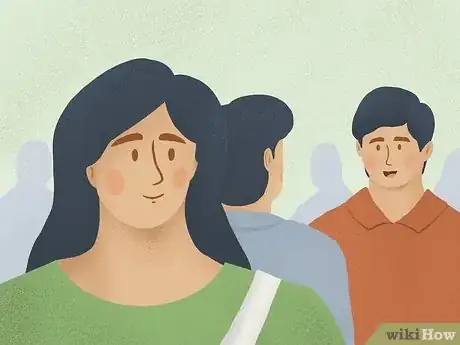This article was co-authored by Rebecca Tenzer, MAT, MA, LCSW, CCTP, CGCS, CCATP, CCFP. Rebecca Tenzer is the owner and head clinician at Astute Counseling Services, a private counseling practice in Chicago, Illinois. With over 18 years of clinical and educational experience in the field of mental health, Rebecca specializes in the treatment of depression, anxiety, panic, trauma, grief, interpersonal relationships using a combination of Cognitive Behavioral therapy, Psychodynamic therapy, and other evidence-based practices. Rebecca holds a Bachelor of Arts (BA) in Sociology and Anthropology from DePauw University, a Master in Teaching (MAT) from Dominican University, and a Master of Social Work (MSW) from the University of Chicago. Rebecca has served as a member of the AmeriCorps and is also a Professor of Psychology at the collegiate level. Rebecca is trained as a Cognitive Behavioral Therapist (CBT), a Certified Clinical Trauma Professional (CCTP), a Certified Grief Counseling Specialist (CGCS), a Clinical Anxiety Treatment Professional (CCATP), and a Certified Compassion Fatigue Professional (CCFP). Rebecca is also a member of the Cognitive Behavioral Therapy Society of America and The National Association of Social Workers.
There are 7 references cited in this article, which can be found at the bottom of the page.
This article has been viewed 95,200 times.
Whether you're looking to start a friendship or a romantic relationship, learning how to develop a close relationship with someone new can be challenging. Often the initial hurdle is finding a like-minded person, but in order to develop a closer bond with someone, you need to be open, honest, and caring. Trust is the key difference between an acquaintance and a close relationship. Here's how to find new friends, communicate on a deeper level, and build trust in order to bring the relationship closer.
Steps
Finding Friends and Partners
-
1Identify someone that you want to get to know better. Initiate conversation about common interests, or questions about them. Whether in a group setting or one-on-one, begin on a lighthearted level.[1]
- Consider using the F.O.R.D. technique, by focusing the conversation on the following topics: Family, Occupation, Recreation, and Dreams (Hopes).
- See a conversation as two sided. Be interested in what others say, and be interesting by relating to others. Share stories, but allow others an opportunity to speak. Be friendly and personable.
- Even if you’re more of an introvert than an extrovert, by simply being positive in the conversation, and showing genuine interest in what the person is saying, you are more likely to develop a closer connection.
-
2Find ways to interact with that person one-on-one. It can be hard to develop a deep relationship with a group. Cultivating closer friendships and relationships often requires one-on-one settings. This may involve doing something outside of work, school, or home.[2]
- Invite someone to lunch, coffee, or a hang-out spot.
- Ask them to go on a hike or walk, or some other outdoor activity.
- Go to a bar for drinks
- Do activities that make you feel like your best self.[3]
- If that person agrees, that’s a good sign that they are interested in also getting to know you, and giving you a chance. If they decline, they may be busy, or less interested in a close relationship.
Advertisement -
3Take an interest in exploring new things with someone. Getting out of your ordinary routine can often help you to be closer with someone. If the new person is interested in things that you normally would be less likely to try, consider trying it. New experiences can help you find new friends, and can possibly help you to be more open and interesting to others. Consider going out of your comfort zone in these ways:
- Go to a local food festival rather than a restaurant.
- Take a day trip to a local state or national park.
- Go to a museum that's not so traditional, like a radio and television museum or a sports hall of fame.
- Consider going to a local comedy show or a play rather than the movies.
- Go to a sporting event that might be outside the usual.
- Take a class together — art, fitness, cooking, or something else that seems different.
-
4Search for a partner. Many successful romantic relationships are not just based on sexual compatibility, but also on a close friendship. It's important that the person you're dating makes you feel attractive and loved, but it's also key that you can communicate about important things.
- Try online dating. This is an opportunity to meet a lot people, and see if you hit it off before meeting up in person.
- Go to parties, events, and social gatherings with the goal of having one-on-one time with someone interesting.
-
5Venture out on your own. Consider doing activities on your own, without the people who you usually hang out with. Doing things independently may push you to talk more with new people, and get you to open up more than usual.
- You're more likely to develop a relationship with someone new if you're not hanging out with a friend already.
Communication and Bonding Tips
-
1Be a good listener. Don’t be distracted and trying to multi-task, especially when trying to have a closer relationship with someone new. They may see your lack of attention or focus as a sign that you are not interested in getting to know them. Consider these ways to show you’re interested in them:[4]
- Actively listen. Give your undivided attention to the new person. Be present.
- Keep eye contact and give non-verbal cues of understanding, such as saying "uh-huh" or nodding your head.
- Paraphrase what they are saying, and give empathetic responses. Consider saying, “It sounds like you had a tough day after taking that final exam. I know it can be stressful. I just had a tough exam last week.”
-
2Spend time together. There is a level of comfort that is built through simply being in the same place, doing something together, and it's an important step toward reaching a place where it feels natural and safe to start having deeper conversations. When watching a movie together, for instance, you're not necessarily talking or relating, but you're having a shared experience and getting used to being in each other's presence.
- Include the other person in your life. Invite them to group outings, sporting events, to join teams or clubs, or to hang out in the park.
-
3Discuss difficult topics.[5] These topics should not likely be discussed the first time you meet someone new, but after you have established a one-on-one rapport with them. Being open to talking about painful topics can bring your closer to someone. Communicate your thoughts and feelings in a deep way. Trust someone new from time to time, as you may feel better in the long run. [6]
- One of the most important topics can be about values and beliefs. By understanding and having a common bond over values and beliefs, you are likely to become closer to that person.
- Stressors about upbringing and recent personal crises may lead to a deeper understanding, as sharing fears or insecurities can be difficult but also cathartic.
- Consider asking questions like, "What was it like for you as a kid?" or "Are you close with your parents?" Finding out about someone's thoughts and feelings is key.
-
4Avoid conversations that are only about you. Make sure both of you get to share what each wants to talk about, and give each person equal opportunity to speak their mind. One-sided conversations may make the new person feel underappreciated, or not important.
- Deeper relationships are based on respecting each other, and valuing each other’s input.
- Consider saying, "That's what it has been like for me last week, what's it been like for you?" or "I want to hear what you've been going through."
- Giving someone the opportunity to speak without interruption is key.
Trust-Building Tips
-
1Allow yourself to be vulnerable. Being vulnerable may seem negative and can be scary, but it is actually a positive way to open yourself to a closer and deeper relationship with someone. Vulnerability involves revealing a part of yourself that is hard to talk about, but important to share with those your trust and is essential to building a close relationship.[7]
- Learn to be emotionally honest. While this may be difficult in large group settings, it’s important to confide in people in smaller or one-on-one settings about your worries and fears.
- Don’t dwell on the negative. Particularly if this is someone new, it’s important to focus on both the positive and negative, rather than just one or the other.
- When someone asks you, "How's your family?" instead of saying, "They're fine," be open about what is bothering you. You don't need to turn the conversation into a venting session, but it can help someone to see what you're going through. You could say instead, "They're pretty well. My mom is sick, but we're all trying to pull together and support her."
-
2Gain someone's trust. Be a dependable friend or romantic partner. Don’t always put off calling or texting someone new due to other priorities. Make time for the special people in your life.
- Being reliable is a key way to build trust. It shows that you do what you say, and that your words are not empty promises.
- Don't play games with someone you like, or possibly love. Be there for them.
- Make an effort to be on-time, or follow through with plans. You will lose someone’s trust if you fail to “honor your word.”
- For example if you know that you'll be running late, be courteous and call or text the person you're meeting. And, if it's likely that you can't make an event, tell them at least 24 hours ahead of time.
-
3Make that person a priority. When you make someone a priority, by calling them back in a timely manner, showing up to a scheduled event on-time, or giving your undivided attention, this will make a big impact on how close you are with that person. [8]
- Make someone feel valued. If you show through your words and actions that this person is both interesting and important, it is likely that the person will respond the same way. Treat others as you would like to be treated.
- If this is a romantic relationship, let someone know you're thinking of them. While it's important to have boundaries in any relationship, fostering love by making someone feel special is key.
- Consider giving a small gift for special occasions, or even just for times when you think they really could use the support.
- Offer your help if they are stressed, worried, or in need of some assistance. Being handy and helpful can make a big difference in a relationship.
Expert Q&A
Did you know you can get expert answers for this article?
Unlock expert answers by supporting wikiHow
-
QuestionHow do you develop a closer relationship?
 Rebecca Tenzer, MAT, MA, LCSW, CCTP, CGCS, CCATP, CCFPRebecca Tenzer is the owner and head clinician at Astute Counseling Services, a private counseling practice in Chicago, Illinois. With over 18 years of clinical and educational experience in the field of mental health, Rebecca specializes in the treatment of depression, anxiety, panic, trauma, grief, interpersonal relationships using a combination of Cognitive Behavioral therapy, Psychodynamic therapy, and other evidence-based practices. Rebecca holds a Bachelor of Arts (BA) in Sociology and Anthropology from DePauw University, a Master in Teaching (MAT) from Dominican University, and a Master of Social Work (MSW) from the University of Chicago. Rebecca has served as a member of the AmeriCorps and is also a Professor of Psychology at the collegiate level. Rebecca is trained as a Cognitive Behavioral Therapist (CBT), a Certified Clinical Trauma Professional (CCTP), a Certified Grief Counseling Specialist (CGCS), a Clinical Anxiety Treatment Professional (CCATP), and a Certified Compassion Fatigue Professional (CCFP). Rebecca is also a member of the Cognitive Behavioral Therapy Society of America and The National Association of Social Workers.
Rebecca Tenzer, MAT, MA, LCSW, CCTP, CGCS, CCATP, CCFPRebecca Tenzer is the owner and head clinician at Astute Counseling Services, a private counseling practice in Chicago, Illinois. With over 18 years of clinical and educational experience in the field of mental health, Rebecca specializes in the treatment of depression, anxiety, panic, trauma, grief, interpersonal relationships using a combination of Cognitive Behavioral therapy, Psychodynamic therapy, and other evidence-based practices. Rebecca holds a Bachelor of Arts (BA) in Sociology and Anthropology from DePauw University, a Master in Teaching (MAT) from Dominican University, and a Master of Social Work (MSW) from the University of Chicago. Rebecca has served as a member of the AmeriCorps and is also a Professor of Psychology at the collegiate level. Rebecca is trained as a Cognitive Behavioral Therapist (CBT), a Certified Clinical Trauma Professional (CCTP), a Certified Grief Counseling Specialist (CGCS), a Clinical Anxiety Treatment Professional (CCATP), and a Certified Compassion Fatigue Professional (CCFP). Rebecca is also a member of the Cognitive Behavioral Therapy Society of America and The National Association of Social Workers.
Clinical Therapist
References
- ↑ http://www.succeedsocially.com/sociallife
- ↑ http://www.helpguide.org/articles/relationships/how-to-make-friends.htm
- ↑ Rebecca Tenzer, MAT, MA, LCSW, CCTP, CGCS, CCATP, CCFP. Clinical Therapist & Adjunct Professor. Expert Interview. 2 October 2020.
- ↑ http://www.pickthebrain.com/blog/5-ways-to-build-better-relationships-with-everyone/
- ↑ Rebecca Tenzer, MAT, MA, LCSW, CCTP, CGCS, CCATP, CCFP. Clinical Therapist & Adjunct Professor. Expert Interview. 2 October 2020.
- ↑ http://www.apa.org/helpcenter/healthy-relationships.aspx
- ↑ http://tinybuddha.com/blog/how-being-vulnerable-can-expand-your-world/
- ↑ https://www.psychologytoday.com/blog/fulfillment-any-age/201210/how-make-your-close-relationship-closer
- ↑ Rebecca Tenzer, MAT, MA, LCSW, CCTP, CGCS, CCATP, CCFP. Clinical Therapist & Adjunct Professor. Expert Interview. 2 October 2020.
About This Article
Developing a close relationship with someone new is all about spending time with them and building their trust. Have deeper conversations with them about both of your beliefs, backgrounds and hopes and dreams for the future. This will help you empathize with them and understand how they think. Make sure you're honest with them and share your own thoughts and beliefs. To build their trust, follow through on your promises as much as you can. If they're stressed or something's bothering them, ask how you can help and support them. As you get to know each other better, you can also introduce them to your other friends and family, which will show that you trust them and bring your lives closer together. For more tips from our co-author, including how to meet interesting people, read on!







































































